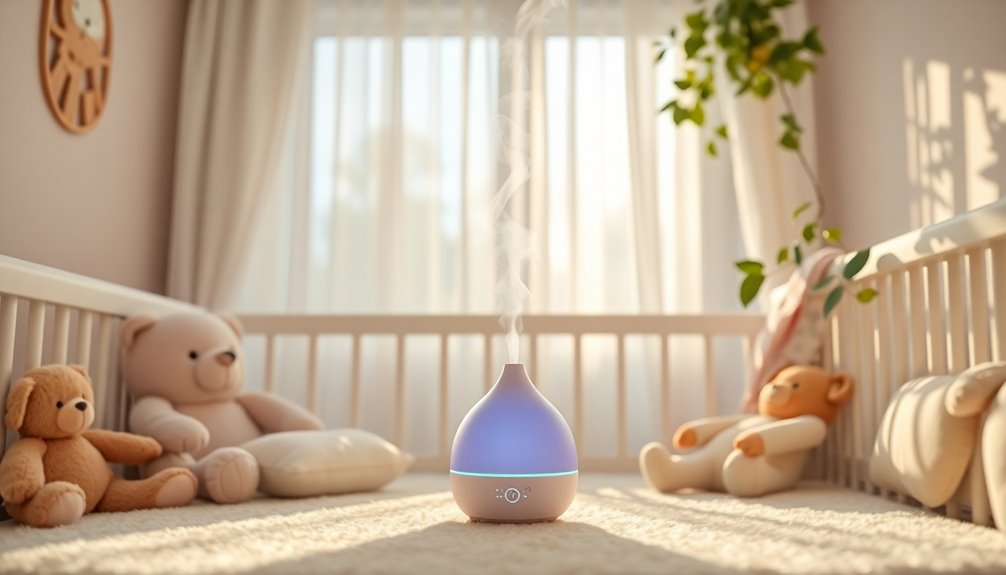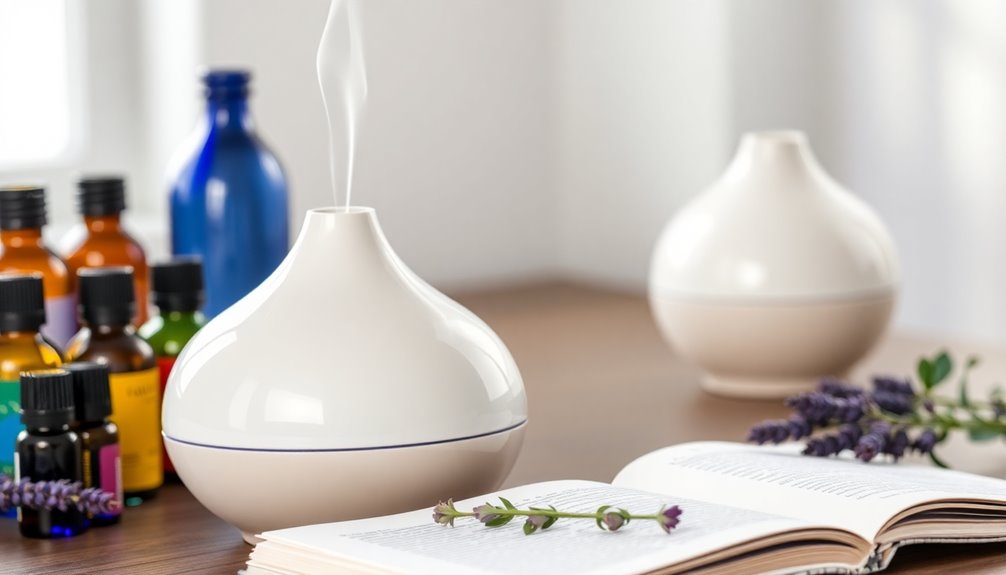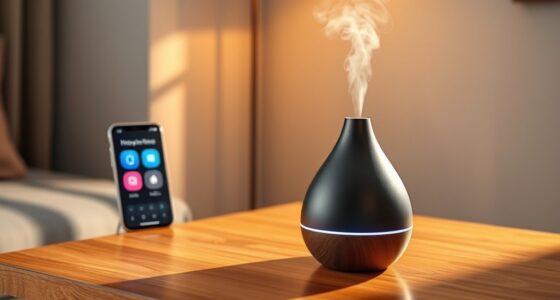Aromatherapy diffusers can be risky for babies due to their sensitive respiratory systems and skin. It's best to consult with healthcare professionals before using essential oils around infants. Some oils are safe when properly diluted, like lavender, but others can cause irritation or allergic reactions. Opt for ultrasonic diffusers that use minimal oils and keep the area well-ventilated. Ideally, avoid using diffusers in the same space as your baby to minimize any potential health risks. Understanding safe practices and the best oils for kids can help you make informed choices, and there's more to explore on this topic!
Key Takeaways
- Aromatherapy diffusers are generally not recommended for infants due to their sensitive respiratory systems and skin.
- Ultrasonic diffusers are safer as they use minimal essential oil, but caution is still advised.
- Essential oils like lavender can be beneficial when properly diluted and used in moderation, but allergic reactions may occur.
- Consulting a pediatrician is crucial to ensure safe practices and appropriate dilution ratios for any essential oils.
- Always monitor for adverse reactions and keep diffusers in well-ventilated areas to minimize risks associated with concentrated oils.
Understanding Aromatherapy Diffusers
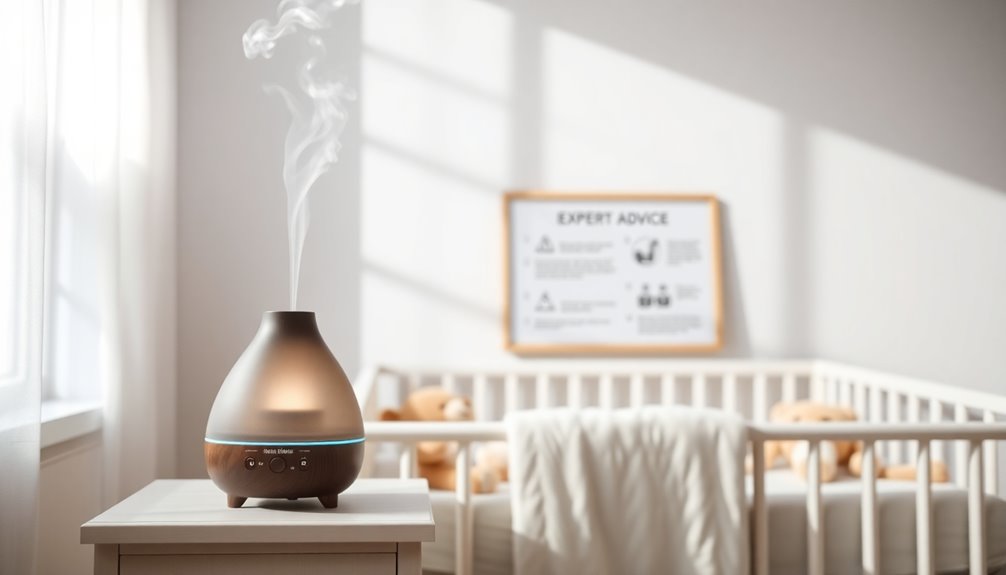
Aromatherapy diffusers are popular tools for enhancing the atmosphere in your home. They disperse essential oils into the air, creating pleasant fragrances, but safety is a significant concern, especially around infants.
It's generally advised to avoid using diffusers when infants are present, as their sensitive systems can react negatively to even diluted oils. For older children, limit diffusion time to 30-60 minutes and guarantee proper ventilation to reduce any risks.
Ultrasonic diffusers are safer options, requiring just a few drops of essential oil mixed with water. However, caution is vital regarding the types of oils you choose. Certain oils, such as tea tree and lavender, can enhance the effectiveness of traditional cleaning agents while also posing potential risks to young children.
Always consult an expert, like a pediatrician, for personalized advice on using diffusers and essential oils safely in your home, especially around young children.
Benefits of Aromatherapy for Babies
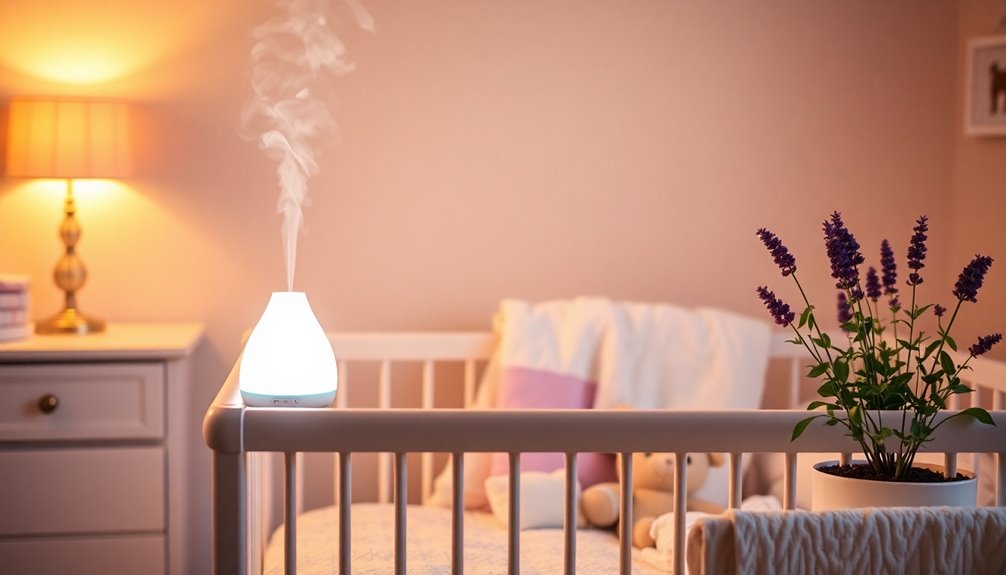
While many parents seek ways to soothe their little ones, incorporating aromatherapy can offer notable benefits for babies. Certain essential oils, like lavender, have calming properties that can help your infant during stressful moments.
When aromatherapy is used safely with properly diluted oils, it can alleviate symptoms of colic and discomfort, providing much-needed relief. A bedtime routine incorporating these oils can create a serene environment, promoting healthy sleep habits that reduce nighttime fussiness.
Additionally, this peaceful atmosphere supports family wellness, benefiting both you and your baby. By embracing aromatherapy, you're not just comforting your little one; you're also fostering a tranquil space that enhances your overall well-being during those challenging times. Conducting patch tests is essential to ensure that your baby does not have any adverse reactions to the oils used.
Essential Oils Safe for Children

How can you guarantee the safe use of essential oils for your little one? First, ascertain you choose essential oils safe for children. For children generally range, lavender and chamomile are good options for those over three months. Always dilute essential oils with a carrier oil before applying; the safe dilution ratios range from 0.5% to 3%, depending on age. Additionally, it is crucial to perform a patch test to check for any allergic reactions before full application.
| Essential Oil | Safety Notes |
|---|---|
| Lavender | Generally safe for children over 3 months |
| Chamomile | Safe for children over 3 months |
| Eucalyptus | Never use in children under 2 years |
| Rosemary | Avoid due to high concentrations |
Remember to patch test first and consult with a healthcare professional before introducing any oils into your child's routine.
Risks of Using Diffusers
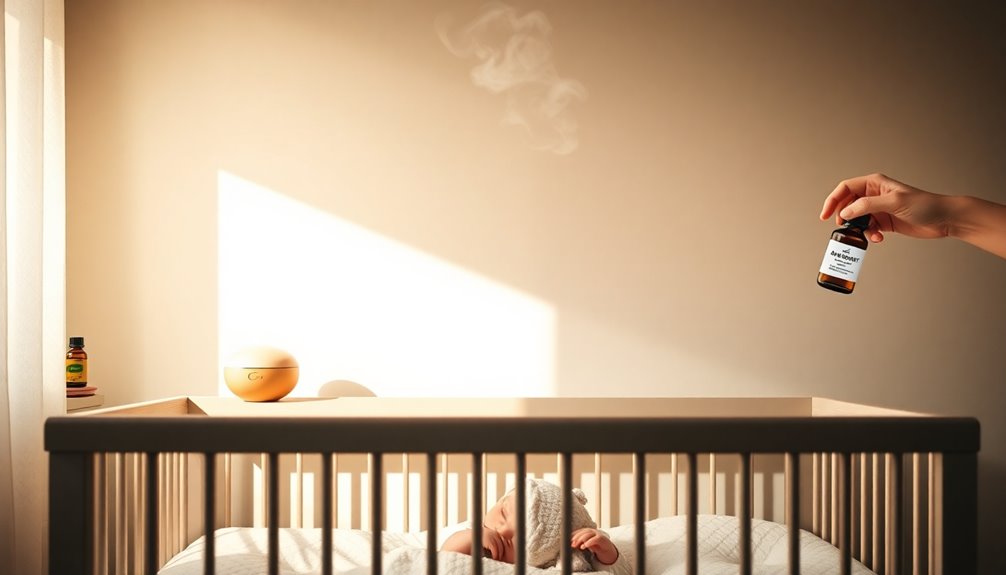
Using diffusers around infants can pose several risks, as their delicate respiratory systems are particularly vulnerable.
The potential for respiratory irritation and allergic reactions increases with prolonged exposure to essential oils. Babies can experience symptoms like coughing and wheezing, especially if they're sensitive.
Additionally, standing water in diffusers can harbor harmful bacteria, further endangering their health. Certain essential oils, particularly those high in 1,8 cineole, can lead to serious respiratory distress in infants.
To minimize these risks, experts recommend limiting diffusion time to 30-60 minutes and ensuring the area is well-ventilated. Regular cleaning of aromatherapy diffusers is crucial to prevent oil buildup and maintain a safe environment for your baby.
Always prioritize your baby's safety and consult with a healthcare professional before using any diffuser around them.
Safety Guidelines for Parents
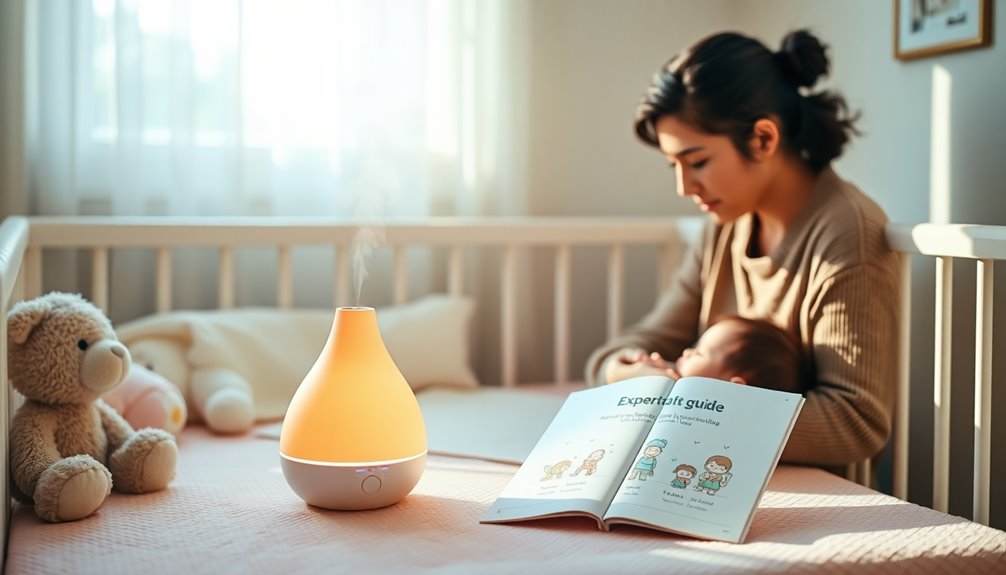
When it comes to using essential oil diffusers around your little ones, following safety guidelines is essential. Always consult with your pediatrician before introducing essential oils into your child's environment. For older children, limit diffusion time to 30-60 minutes, ensuring proper ventilation to minimize irritation.
Here's a quick reference for safe practices:
| Essential Oils | Safe for Children | Patch Test Required |
|---|---|---|
| Lavender | Yes | Yes |
| Chamomile | Yes | Yes |
| Oils high in 1,8 cineole | No | N/A |
Additionally, it's important to note that aromatherapy can aid in mental clarity and emotional balance, which may benefit the overall environment for children.
Recommended Practices for Diffusion
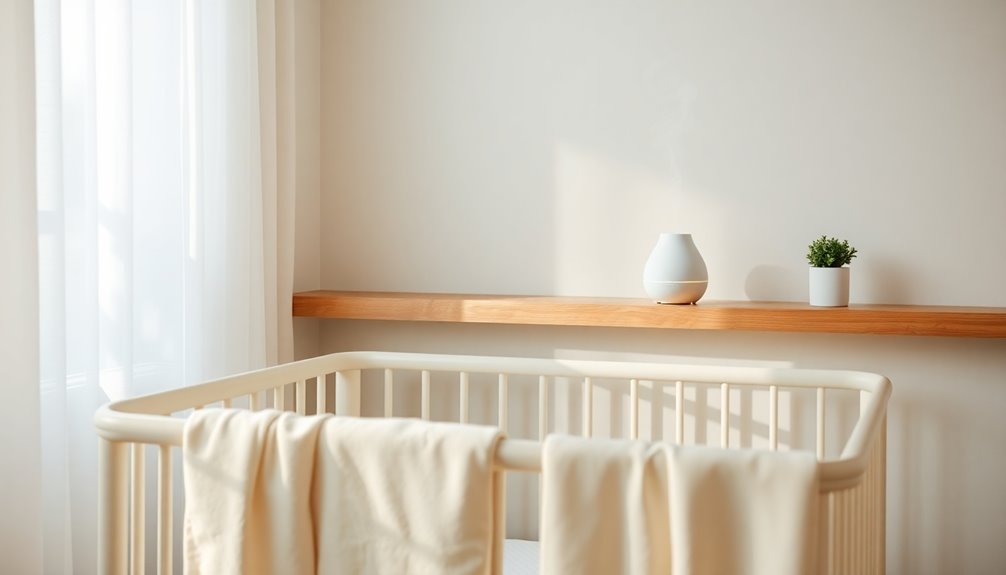
To create a soothing environment for your baby, it's crucial to adopt recommended practices for diffusion that prioritize safety and comfort.
Always use diffusers in well-ventilated areas to guarantee fresh air access and minimize potential irritants. Limit diffusion time to 30-60 minutes to prevent prolonged exposure to essential oils, allowing for breaks.
Choose essential oil blends specifically formulated to be safe for children, steering clear of potent oils that may cause irritation. Ultrasonic diffusers are a great option; use only 1-3 drops of essential oil on an intermittent setting. Additionally, consider using oils that promote emotional and physical wellbeing, as these can enhance the soothing effects for your baby.
Most importantly, monitor babies closely for any adverse reactions when introducing new scents, guaranteeing their comfort and well-being at all times.
Expert Insights on Essential Oils
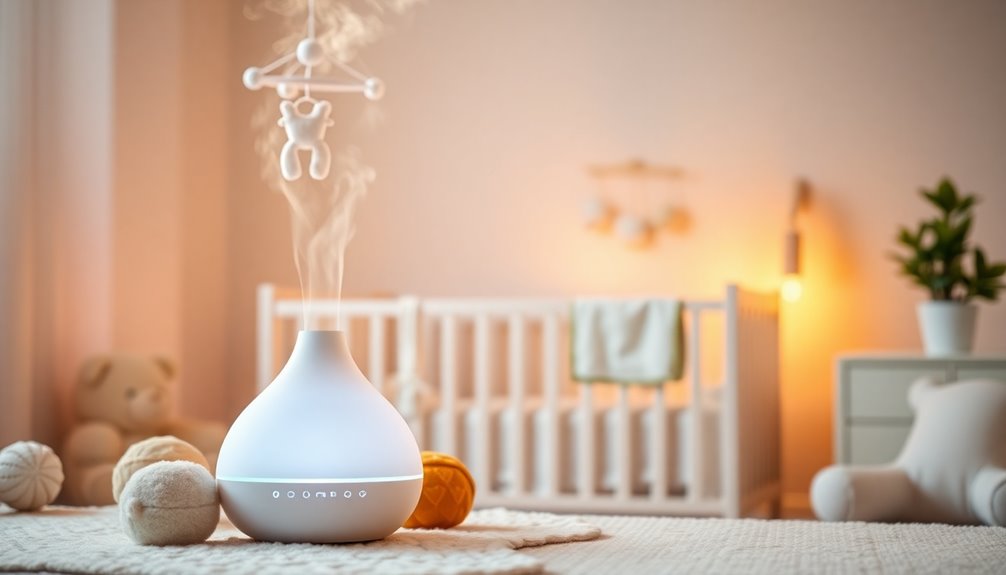
When using essential oils around babies, safety should always be your top priority.
Experts recommend consulting with healthcare professionals before introducing any oils into your baby's environment.
It's vital to choose specialized blends designed for infants to minimize potential risks and guarantee a safe experience.
Essential Oil Safety
Essential oil safety is an essential consideration for parents looking to incorporate aromatherapy into their baby's environment.
While essential oils can offer benefits, you must use oils near your baby with caution. Always avoid concentrated oils, as they can irritate your infant's sensitive skin and respiratory system.
It's important to apply a patch test if you consider using any oils, ensuring you've diluted them properly to safe dilutions.
Remember, some oils, like eucalyptus and hyssop, are particularly harmful for young children.
Never apply essential oils directly on their skin; always consult with a healthcare professional first.
If you have any concerns or notice adverse reactions, don't hesitate to call your doctor for guidance.
Expert Recommendations for Use
While incorporating essential oils into your baby's environment can be beneficial, experts strongly recommend exercising caution.
Pediatricians advise against diffusing standard essential oils around infants due to their sensitive respiratory systems. Instead, opt for specialized blends designed specifically for young children, ensuring their safety.
Be particularly cautious with oils high in 1,8 cineole, as they can pose respiratory risks. When using aromatherapy diffusers, always place them in well-ventilated areas and limit diffusion time to avoid prolonged exposure.
It's crucial to consult a healthcare professional for personalized guidance before introducing any essential oils or diffusers into your baby's space.
Prioritizing safety will help create a soothing environment without compromising your child's health.
Common Misconceptions About Aromatherapy
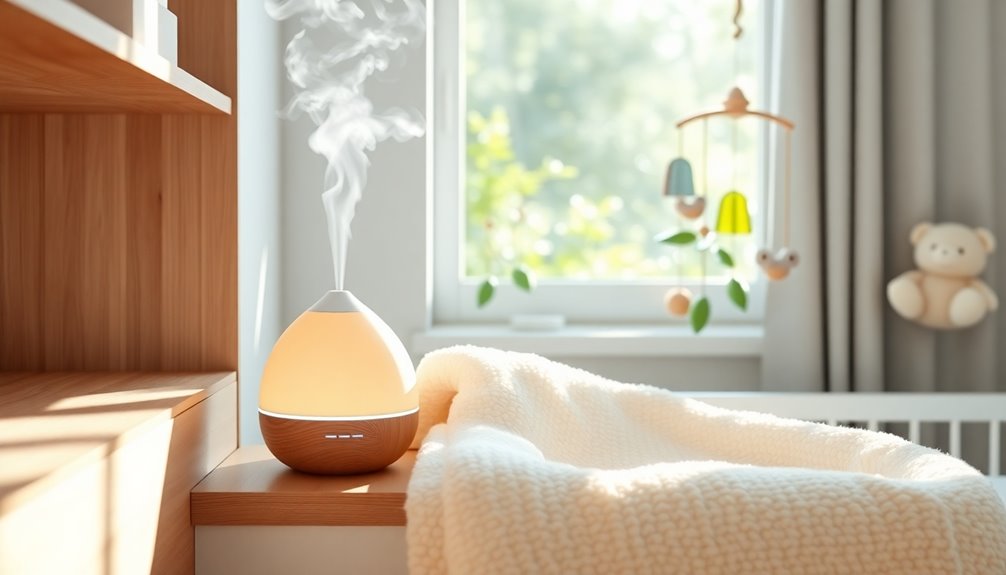
What do you really know about the safety of aromatherapy for babies?
It's crucial to understand some common misconceptions:
- All essential oils are safe: This isn't true; some oils can harm babies' sensitive skin and respiratory systems.
- Diffusing is harmless: Many believe it's safe, but experts recommend you avoid diffusion in the presence of infants due to potential respiratory issues.
- Natural means safe: Just because essential oils are natural doesn't mean they can't cause skin irritation or other adverse reactions.
- All oils promote sleep: Not every oil is beneficial; avoid eucalyptus and peppermint for infants.
Consulting Healthcare Professionals

Understanding the safety of aromatherapy for babies leads to the significant step of consulting healthcare professionals. Before introducing essential oils or diffusers, it's essential to seek advice from a pediatrician.
Infants have sensitive skin and immature systems, making them more susceptible to adverse reactions. Experts generally recommend avoiding essential oil diffusion around babies, as inhalation can cause respiratory irritation and other health issues.
When consulting a healthcare professional, ask about safe dilution practices and which essential oils are suitable for infants. Regular communication with healthcare providers keeps you informed about the latest safety concerns regarding essential oil use for children, ensuring you make the best choices for your little one's health and well-being. Additionally, discussing age-specific risks related to essential oil use can provide further guidance on safe practices for your baby.
Resources for Safe Aromatherapy Usage
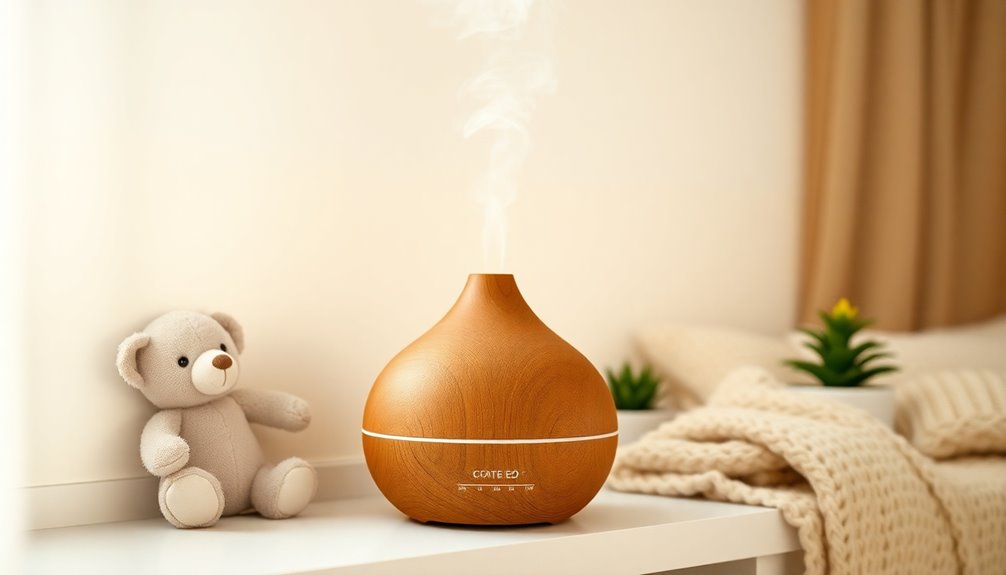
When considering aromatherapy for your little one, it's important to access reliable resources that emphasize safety and best practices.
Here are some key points to guide your essential oil usage around children:
- Consult a pediatrician before introducing essential oils to confirm they're appropriate for your child.
- Read product labels carefully for safety precautions and specific usage instructions to avoid any risks.
- Always use diffusers in well-ventilated spaces to allow fresh air circulation and minimize concentrated oil particles.
- For older children, limit diffusion time to 30-60 minutes to reduce potential respiratory issues.
Frequently Asked Questions
Are Essential Oils in Diffusers Safe for Babies?
When it comes to using essential oils in diffusers around babies, you've got to be cautious.
Babies have sensitive respiratory systems, making them more vulnerable to irritation. Their delicate skin can also react poorly to essential oils, so dilution is key.
It's best to avoid oils high in 1,8 cineole, like eucalyptus.
Always consult your pediatrician before introducing any essential oils into your baby's environment to guarantee it's safe for them.
Are Aroma Diffusers Safe for Lungs?
When considering if aroma diffusers are safe for lungs, you should be cautious. They can release tiny particles that may irritate respiratory systems, especially for those with asthma or allergies.
Prolonged exposure might lead to symptoms like coughing or wheezing. If you're using a diffuser, make certain the area is well-ventilated and limit the time it runs to reduce potential risks.
Always choose essential oils carefully, avoiding those known to irritate the airways.
What Essential Oils Cannot Be Used Around Babies?
Have you ever wondered which essential oils you should steer clear of around babies?
It's vital to avoid oils like eucalyptus, hyssop, and Idaho tansy, as they can cause skin irritation or respiratory issues. Oils high in 1,8 cineole, such as eucalyptus and rosemary, may lead to respiratory distress in infants.
Also, never use toxic oils like Birch and Wintergreen in your home.
Stick to specialized blends designed for infants to guarantee their safety.
Can a Diffuser Be Used as a Humidifier for Babies?
You might wonder if a diffuser can be used as a humidifier for your baby's room.
While diffusers can add some moisture, they're not designed for that purpose and often don't provide adequate humidity levels.
Instead, consider using a dedicated humidifier for effective moisture.
This helps maintain a comfortable environment without the risks associated with prolonged exposure to essential oils, which could irritate your baby's sensitive respiratory system.
Prioritize their safety and comfort.
Conclusion
In the enchanting world of aromatherapy, keeping your little one's safety in mind is key. While diffusers can create a soothing atmosphere, remember that not all essential oils are cuddly companions for babies. By following safety guidelines and consulting with healthcare professionals, you can enjoy the aromatic benefits without any worries. So, as you commence on this fragrant journey, let common sense be your trusty guide, ensuring a harmonious environment for your precious bundle of joy.

